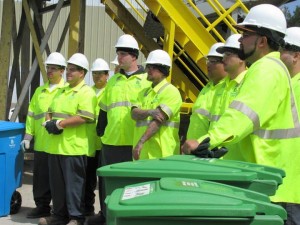US Breaks Guinness World Record, Proving America is the True Birthplace of the Cocktail
 NYC Mixologist makes 1,003 cocktails in one hour and does it “green” with the help of the world’s only sustainable vodka, 360 Vodka
NYC Mixologist makes 1,003 cocktails in one hour and does it “green” with the help of the world’s only sustainable vodka, 360 Vodka
NEW YORK, March 18 – On Sunday night, history was made when local mixologist and tri-athlete, Sheldon Wiley shattered Germany’s world record for making the most cocktails in one hour, creating 1,003 premium, mouth-watering cocktails and bringing the title back to the US where it rightfully belongs.
A rivalry between Germany and the US emerged as the world record exchanged hands in recent years, but Wiley put an end to this cycle on Sunday night when he broke the existing record of 937 cocktails set by German mixologist Matthias Knorr on July 25, 2010.
“I wanted this record to be about more than just speed,” said Wiley, “I wanted to exemplify the integrity and craft of cocktails in an environmentally responsible way to showcase America’s commitment to cocktail culture.”
To honor this commitment, Sheldon used four ingredients, (Germany used the minimum requirement of three,) he avoided the use of a fountain gun that diminishes the quality of cocktails and made each cocktail premium and eco-friendly using the world’s only sustainable vodka, 360 Vodka.
“As an avid green supporter, I insisted on partnering with American made 360 Vodka who helped me leave the smallest footprint possible while setting this exciting new world record,” said Wiley. “They provided me with compost bins, recycling totes, 85 percent recycled glass bottles, seed coasters and other key ingredients to ensure mother earth received a special drink too.”
“We were proud to support Sheldon in his quest to break such an important world record for the mixology industry “said Vic Morrison, Vice-President of Marketing for the Earth Friendly Distilling Company, makers of 360 Vodka. “Sheldon raised the bar, and we will raise a glass to him and the environment for years to come.”
While Wiley was cheered on by many mixologists from across the country, the Guinness adjudicator kept a close eye on his progress. The strict rules, set and enforced by the Guinness World Record Authority stated that each cocktail must contain no less than three ingredients, be unique, made one-at-a-time and in a pre-determined order. Wiley did it 1,003 times.
“Breaking the world record, while respecting the art of the cocktail and making Mother Nature proud is thrilling! Finally, my thirst has been quenched.”From/PRNewswire/
1-800-Recycling.com Partners with Organic Authority
 LOS ANGELES–(BUSINESS WIRE)–It was announced today that 1-800-Recycling.com, an interactive nationwide company dedicated to simplifying and enhancing the consumer recycling experience, has partnered with www.OrganicAuthority.com, an online resource that provides a wide range of information while educating the public about the benefits of buying and choosing organic produce, meats, and products, while promoting sustainable living and an organic lifestyle. “We are extremely proud to be partnering with Organic Authority”
LOS ANGELES–(BUSINESS WIRE)–It was announced today that 1-800-Recycling.com, an interactive nationwide company dedicated to simplifying and enhancing the consumer recycling experience, has partnered with www.OrganicAuthority.com, an online resource that provides a wide range of information while educating the public about the benefits of buying and choosing organic produce, meats, and products, while promoting sustainable living and an organic lifestyle. “We are extremely proud to be partnering with Organic Authority”
Via its mobile App, online resource and phone service, 1-800-Recycling provides information about recycling services and facilities to anyone, anywhere by zip code. Designed to make the recycling process easy and more accessible, 1-800-Recycling.com’s widget will now also be a clickable icon on the MyZeroWaste.com site. As part of the partnership with Organic Authority, 1-800-Recycling.com’s new interactive widget will now be housed at OrganicAuthority.com, so users of Organic Authority’s resources will be able to quickly search for ways to recycle unwanted items near to their homes.
“At Organic Authority, we believe that implementing small fundamental changes in the choices we make everyday – by eating fresh, delicious organic foods, for example – will have a large impact on the future of healthy families around the world and protect Mother Earth for generations to come,” said Laura Klein, Founder/Editor of Organic Authority. “As part of our mission, we work every day to encourage small lifestyle changes that save both time and money, while adding up to greater personal and global good. Recycling unwanted items is a perfect example of a simple thing anyone can do to have a positive impact on our planet. Partnering with 1-800-Recycling makes a lot of sense since our missions are so closely aligned – we’re both working to empower people to make simple and meaningful changes that will benefit our environment.”
“We are extremely proud to be partnering with Organic Authority,” said John Shegerian, Chairman and CEO of Electronic Recyclers International, the US’ leading recycler of electronics and e-waste, and parent company of 1-800-Recycling.com. “1-800-Recycling shares a common mission with Organic Authority – to provide our users with greater accessibility to a greener life. Our hats are off to Laura and the Organic Authority team for the terrific resource they have been providing to their readers. The recipes, advice, and commentary all make such a strong case for the benefits of eating organic. Through our new relationship, we will now be able to offer Organic Authority’s followers yet another resource to enhance their green lifestyles – an easy way to recycle their unwanted items and keep them out of landfills.” For more information on recycling needs, visit www.electronicrecyclers.com, http://1800recycling.com or www.urbanmining.org.
GREEN IS GOOD
Electric Vehicle makers partner in battery recycling
 by Andrew Roberts:As vehicle manufacturers gear up to bring electric cars to the commercial market in full force, a new emphasis on electric battery recycling has emerged.
by Andrew Roberts:As vehicle manufacturers gear up to bring electric cars to the commercial market in full force, a new emphasis on electric battery recycling has emerged.
The most prominent companies that have jumped on the recycling bandwagon include Nissan, Tesla and General Motors, all of which recently announced that they would begin researching more sustainable ways to dispose of electric vehicle batteries. The more creative ideas include using the batteries as backup generators for hospitals or storage units for wind farms.
Regardless the usage, it seems that the success of second-life battery industry remains in partnerships for these large corporations. GM announced today that it will join international electrics giant, ABB to begin developing second-life technologies for its Chevy Volt battery. Likewise, SolarCity made a similar announcement saying it would join Tesla to find ways to reuse the automakers car batteries to store solar power once it had been generated.
Just last week, Nissan made the announcement that it will be joined by Japanese conglomerate, Sumitomo in a joint venture company named 4R Energy. 4R Energy will take on the task of finding second-life uses for Nissan’s car batteries as well.
Since batteries continue to be expensive, they still remain a large portion of the cost for EV makers. Running from $800 to $1,000 for one kilowatt-hour, batteries can account for up to one-third of the overall cost of producing an electric vehicle. According to Pike Research analyst, John Gartner, devising ways to recycle these batteries, ideally at a profit, is essential for EV makers to have successful products in the industry.Source: Recycle.co.UK
Glass Recycling week in effect
 The Glass Packaging Institute (GPI) is teaming up with Keep America Beautiful Inc. (KAB) to promote GPI’s Recycle Glass Week and KAB’s America Recycles Day, which is a nationally recognized day for community-driven initiatives dedicated to promoting and celebrating recycling in the U.S.
The Glass Packaging Institute (GPI) is teaming up with Keep America Beautiful Inc. (KAB) to promote GPI’s Recycle Glass Week and KAB’s America Recycles Day, which is a nationally recognized day for community-driven initiatives dedicated to promoting and celebrating recycling in the U.S.
“GPI is delighted to partner with such an extraordinary organization to advance recycling in communities across the country,” says Joseph Cattaneo, president of GPI. “Keep America Beautiful’s America Recycles Day and GPI’s Recycle Glass Week are two great events that share a common purpose: educating consumers about the environmental benefits of recycling and encouraging action.”
Adds Matthew M. McKenna, president and CEO of KAB, “Uniting our resources, networks, and constituents to promote recycling helps amplify our shared message. Recycling is the easiest thing that any individual or organization can do to save energy, protect our treasured natural resources, and reduce greenhouse gas emissions. And it has never been more important.”
During GPI’s second annual Recycle Glass Week, September 12 to 18, communities across the U.S. will unite with glass container manufacturers, suppliers, and recyclers, to hold local activities and events to build awareness and boost glass bottle recycling.
“Consumers who recycle glass bottles and jars make a difference,” says Cattaneo. “Their efforts count. Glass is endlessly recyclable, and there are big energy savings when recovered glass is used to make new bottles. We hope these Recycle Glass Week events will call attention to the value of glass container recycling and ultimately help us reach the goal of using 50-percent recycled glass in the manufacture of new containers by the end of 2013.”
Since its inception in 1997, communities across the country have participated in America Recycles Day on November 15th to promote environmental citizenship, educate, and encourage action. Through America Recycles Day, KAB and its partners work to empower communities to directly engage their residents in the act of recycling.
During Recycle Glass Week, GPI will also announce the 2010 Clear Choice Awards winners and will recognize Friends of Glass, those organizations or persons that recycle glass or promote the recycling of glass.
Recycling in the big cities
 As Dustin Hoffman was advised in The Graduate . . . “Plastics!”
As Dustin Hoffman was advised in The Graduate . . . “Plastics!”
New York Mayor Michael Bloomberg recently signed legislation that will significantly expand the city’s recycling program to include all rigid plastic containers for recycling. Bring on the yogurt tubs, flower pots and medicine bottles! That may mean more than 8000 more pounds of plastics annually, in addition to plastic 1 and 2 that are already collected. The only catch is that it won’t begin until a new recycling facility in Brooklyn is completed–probaby not until 2012.
MEANWHILE in Philadelphia, I learned that the City of Brotherly Love now will accept all 1 through 7 plastics. The city’s recycling rate used to be among the lowest for large cities, so this is laudable. In 2006, Philly households recycled only about 5.5 percent of their waste. That rate has risen to 16 percent as the city has added materials, moved to weekly collections, and switched to “single-stream” recycling, in which all items can be placed into one bin.
In 2009, the city hired RecycleBank, which operates a program that gives residents coupons and other rewards for recycling. They don’t expect a huge increase in tonnage since these additional plastics are light–supposedly categories 3 to 7 amount to only 4 percent of the waste stream. In addition to Philly, RecycleBank is a nifty program that seems to be succeeding in Hartford, CT; Wilmington, DE; Chicago, IL; Atlanta, GA; Albuquerque, NM and Plano, TX.
The Philadelphia Inquirer reported that the city also rebid its recycling contract, getting more favorable rates. “It not only saves $68 a ton in landfill costs but also recoups $51.37 a ton for recyclables from Waste Management Inc., based in Houston.” That savings will likely exceed $400,000.
Adding numbers 3 through 7 to the municipal recycling stream is a growing trend. Washington State expanded to recycling all plastics in 2008 when a local market for the commodity opened up. In the Philly region, some suburban towns expanded two years ago when the Allied Waste sorting facility in King of Prussia completed a $5 million upgrade. Even small township Haverford started recycling 1 through 7. The first year, the township increased its recycling by 400 tons and saved residents about $150,000 through lower tipping fees and higher payments for the recycled materials. Neighboring Radnor expanded to single-stream recycling and added all the plastics categories in February of 2010. Pottstown’s nonprofit Recycling Services Inc. is still renowned among recycling addicts for the variety of materials it accepts, including waxed juice cartons and fishing line.
Across the Delaware River in N.J., Collingswood claims to be the only municipality in Camden County to recycle all plastics. Their hauler does not accept 3-and-up plastics. But borough residents raised such a ruckus that officials installed a special dumpster at a drop-off site. In the first five months, Collingswood collected seven tons of plastics. This year, they predict that the town will collect 25 to 30 tons, that would otherwise cost $2,000 to dispose in a landfill.
The higher-numbered plastics were always recyclable, but sorting was expensive and the commodity market was low. Now prices are rising, so more communities are recycling more plastics. Partly due to the extra categories now accepted in more cities, recycling of plastics rose 11 percent from 2007 to 2008, the last year for which nationwide statistics are available. The list of haulers accepting all numbers of plastics keeps expanding.
Still, environmentalists are not all gung-ho on increased plastics recycling. They worry it will lull consumers into complacency about all the packaging they buy. Their golden rule is now Reduce, Reuse, and Recycle as a Last Resort.
Another thorny problem is that many of the higher-number plastics are sent to China for further sorting and reuse. Transporting all that plastic raises concerns about the carbon footprint, plus the human-rights aspect of using cheap labor with minimal environmental protections.
When it comes to being reused, each has a different melting point. So contamination can cause a mess. So that’s part of the motivation for a city to collect all the plastics. Then consumers don’t need to make the distinctions.
No word yet on if or when Virginia residents can toss ALL plastics into our curbside bins.Source: Easy Being Greener
52,000 Fans, 1-800-Recycling.com Is Now #1 Green Site on Facebook
2010-09-07 19:58:07 – 1-800-Recycling.com, an interactive nationwide company dedicated to simplifying and enhancing the consumer recycling experience, has announced that its Facebook fan page has surpassed 52,000 fans, making it the #1 Green site on all of Facebook.
Via its mobile App, online resource and phone service, 1-800-Recycling provides information about recycling services and facilities to anyone, anywhere. The system provides users with nationwide outreach
to find recycling locations : nearest to them (every zip code in the country is covered) for whatever it is they wish to recycle. Its Facebook fan page enables Facebook users to share recycling information and receive updates from 1-800-Recycling on new recycling trends and activities.
“We are extremely proud of the tremendous success of our presence on Facebook,” said John Shegerian, Chairman and CEO of Electronic Recyclers International (ERI), the nation’s leading recycler of electronics and e-waste, and parent company of 1-800-Recycling.com. “That we have been so readily embraced by the Facebook community shows just how much people want and need a simplification of the recycling process. Our social media team has worked tirelessly to make this effort a success and we are all being rewarded by their efforts now.”
Evan Bailyn, founder of GoodMedia.com :and FirstPageSage.com: , and social media guru to 1-800-Recycling.com, helped lead the charge.
“As with any good social media growth and outreach practice,” said Bailyn, “we’ve been connecting with strategically selected influencers and making them aware of information that is useful to them. With 1-800-Recycling, it has been a natural progression because we’re offering something that genuinely helps people to be greener and makes it easier to recycle. The Facebook community has embraced the concept at breakneck speed – making 1-800-Recycling the most popular green site on all of Facebook in only a few months – and we expect this growth to continue exponentially.”
560,000 Tons to Go…
Posted in Diversion, Policy, San Francisco, Waste Reduction, You Should Know… by tulip on September 3, 2010
This week San Francisco Mayor Gavin Newsom took time out to commend some of the 1,000+ Recology employees in San Francisco that helped achieve the 77% diversion rate for the city in 2009.
In a press release dated August 27th, the Mayor’s office explained that the 77% diversion rate for the city sets a new record in the United States. 1.6 million tons that would have gone to a landfill were instead recycled, composted, reused or donated.
The other 560,000 tons of “garbage” that was generated by San Francisco’s residents and tourists went to a landfil in 2009. That’s quite a lot of material, which is why cultivating the right habits and educating others about landfill diversion is so important.
Congratulations to Recology Sunset Scavanger, Recology Golden Gate, and Recology San Francisco for bringing us a little closer to the goal of zero waste!
Solar Waste Recycling: Can the industry stay green?
By Erica Gies
In recent years the electronics industry has gained notoriety for creating an endless stream of disposable products that make their way at life’s end to developing countries, where poor people without safety gear cut and burn out valuable materials, spilling contaminants into their water, air and lungs.
Solar modules contain some of the same potentially dangerous materials as electronics, including silicon tetrachloride, cadmium, selenium and sulfur hexafluoride, a potent greenhouse gas. So as solar moves from the fringe to the mainstream, insiders and watchdog groups are beginning to talk about producer responsibility and recycling in an attempt to sidestep the pitfalls of electronic waste and retain the industry’s green credibility.
Solar modules have an expected lifespan of at least 20 years so most have not yet reached the end of their useful lives. But now, before a significant number of dead panels pile up, is the perfect time to implement a responsible program, said Sheila Davis, executive director of the Silicon Valley Toxics Coalition. Read on
More Recycling


